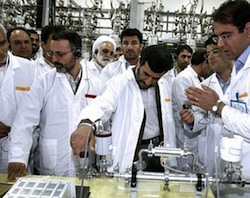Iran Reports Beginning Higher Uranium Enrichment
Featured Image
We are happy to serve you a daily summary of the day's top nuclear policy stories each morning, with excerpts from the stories in bullet form.
Stories we're following today:
Iran Is Said to Begin Nuclear Enrichment - New York Times [link]
- Brushing aside international calls for stricter sanctions against it, Iran said Tuesday it had begun enriching uranium for use in a medical reactor to a higher level of purity, raising the stakes again in its dispute with the United States and other countries over its nuclear program.
- The United States responded by saying it would seek United Nations backing for new sanctions within weeks.
- “The beginning of the enrichment is not tantamount to the end of interaction and negotiations” on the a fuel exchange negotiated by the United Nations, said Ali Akbar Salehi, the head of Iran's Atomic Energy Organization. “The Islamic Republic of Iran is still ready to continue cooperation if the negotiation parties act wisely and end wasting time.”
- The United States has begun circulating ideas for possible sanctions among its closest allies on the Security Council and is hoping that Iran’s announcement might convince China that Tehran’s real purpose is to create a weapon, and not the civilian use of nuclear energy.
Analysis: Iranian Plan Will Put Nation a Step Closer to Having Material for Bomb - Glenn Kessler in the Washington Post [link]
- Iran couched its announcement in terms of a pressing need for fuel at a 41-year-old, U.S.-built research reactor that produces medical isotopes for an estimated 850,000 kidney, heart and cancer patients. But in reality it means that Iran will be a significant step closer to possessing the raw material needed to build a nuclear bomb.
- Indeed, Iran does not have the expertise to build the specialized fuel rods needed for the research reactor -- only France and Argentina are expert at it -- so the main consequence of Iran's decision appears to be moving up the enrichment ladder. If Iran tried to fuel the reactor itself, absent international assistance, it would be risky to the reactor and for public safety, according to David Albright, president of the Institute for Science and International Security in Washington.
- Meanwhile, enriching uranium under the guise of medical needs will get Tehran much closer to possessing weapons-grade material. Iran insists it has no interest in nuclear weapons. But Albright said 70 percent of the work toward reaching weapons-grade uranium took place when Iran enriched uranium gas to 3.5 percent. Enriching it further to the 19.75 percent needed for the reactor is an additional "15 to 20 percent of the way there."
- Once the uranium is enriched above 20 percent, it is considered highly enriched uranium. The uranium would need to be enriched further, to 60 percent and then to 90 percent, before it could be used for a weapon. "The last two steps are not that big a deal," Albright said. They could be accomplished, he said, at a relatively small facility within months.
- Note: The Institute for Science and International Security (ISIS) is a Ploughshares grantee.
N.Korea's Kim Said to Pledge Nuclear Disarmament - Associated Press [link]
- North Korean leader Kim Jong Il reiterated his country's pledge to achieve a denuclearization of the Korean peninsula when he met a senior Chinese envoy, Beijing's official news agency reported Tuesday.
- "The sincerity of relevant parties to resume the six-party talks is very important," Kim said during a meeting Monday with top Chinese Communist Party official Wang Jiarui, Xinhua News Agency reported from Pyongyang. Kim reiterated his country's "persistent stance to realize the denuclearization" of the peninsula, it said.
Jon Stewart: "The Problem Seems to be the Weapon" - Nukes of Hazard [link]
- Last week Stewart once again sported his nuke policy wonk credentials in an interview with Fox News' Bill O'Reilly. Below is a brief excerpt from the exchange on nukes, which occurred in the context of O'Reilly vetting Stewart for a hypothetical O'Reilly-Stewart '12 ticket.
O'REILLY: All right, let's go to Iran. If you're my VP, I'm going to have to put you in charge of very delicate negotiations. Now Iran's building, you know, nuclear weapons over there. And if they get them, they might give them to some guy named Ahmed, who might take then to them Cleveland and blow everything up. So what are we going to do with that?
STEWART: Well, doesn't Pakistan have a nuclear weapon?
O'REILLY: Yes, they do.
STEWART: Well, couldn't they give it to somebody?
O'REILLY: I don't know. I don't think…
STEWART: Doesn't Russia have nuclear weapons?
O'REILLY: Russia does.
STEWART: Couldn't they give it to somebody?
O'REILLY: They could.
STEWART: The problem isn't the country that gets them. The problem seems to be the weapon."
- A transcript of the full conversation can be read here. Or watch it beginning at the 1:22 mark of the embedded video, below:
Missile Silo Confessions: Living on the Edge of Armageddon - Wired Photo Gallery[link]
- The Titan II missile silo complex was first carved out with dynamite in the early ’60s and manned by a crew whose job it was to ensure our enemy’s mutual destruction should we enter nuclear war. It was later dismantled and sealed up to comply with international treaties. After sitting buried beneath rubble for two decades, the site was ready to be explored.
- Many abandoned nuclear missile sites are now owned by regular citizens trying to find a function for them. Read on to probe the depths of Reeves’ silo and hear from ex-crew members who had their fingers on the button when Armageddon was just a command away.




